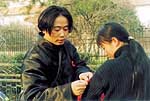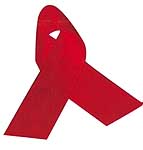|
On December 1 - known
to some as International AIDS Day - a small crowd of
onlookers and photographers watched Beijing performance
artist Sheng Qi take a stand in front of the National
Art Gallery. He once cut off the pinky finger of his
own left hand in solemn protest at repression of the
arts. But today, dressed in a sober black Chinese jacket,
his most violent act is to pin small red ribbons on
willing passersby. A motley group of Tibetan peddlers
stand next to him. They are dressed in yak skin coats
and carry knives and trinkets for sale.
"Have you heard about
AIDS?" says the performance artist as he pins a red
ribbon onto one of the Tibetans. "I don't know" shrugs
the Tibetan, grinning broadly, before pointing to the
foot bones and claws of a tiger strapped to his belt
and asking if anyone wants to buy them.
On the same day, an
equally bizarre event transpires. The State Administration
for Industry and Commerce bans safe sex advertisements
as a violation of advertising "sexual aids." The decision
unceremoniously ends China's first ever nationally-televised
public awareness campaign promoting condom use. The
television spot was not at all explicit - it depicted
a cartoon condom fighting off attacks of the HIV virus
and other sexually transmitted diseases.

The first cases of HIV
infection were reported in China in the early 1980s.
Nobody knows how many people are infected: figures range
from recent Xinhua New Agency fictions as low as 15,000,
to estimates by some health experts as high as one million
or more.
The public attitude
in China toward AIDS is one of fear fueled by ignorance.
Many well-educated city dwellers believe hearsay about
the disease - that it can be passed on by shaking hands,
or that it only comes from foreigners or homosexuals.
People are afraid to know whether they are HIV-positive
because of the social stigma that results if anyone
finds out. The lack of a coherent official attitude
doesn't help. The bizarre decision to ban condom advertisements
on International AIDS Day is a bitterly ironic indication
of how far the authorities are from a sober policy to
address what could be China's biggest public health
issue in the coming century.
Despite other more positive
signs such as a report in the Beijing Morning Post (Beijing
Chen Bao) debating whether condoms should be handed
out at schools, HIV and AIDS are still taboo subjects
for most of society.
The 33 year-old performance
artist Sheng Qi is attempting to eradicate this stigma
with a socially-oriented project that involves handing
out small red ribbons - the international symbol of
AIDS awareness - as well as leaflets about a United
Nations HIV website. Red ribbons also feature in much
of his current art work with photo-collages, paintings
on mirrors, and prints made with his four-fingered hand
onto red silk.
Sheng Qi came to public
attention in 1985 as a key members of China's "New Art
Movement." The cŽnacle organized a series of collective
performance events under the title Concept 21. Most
of these involved the participants painting their bodies
or wrapping themselves in white cloth while running
on the Great Wall, cycling, doing martial arts and other
symbol-laden activities. The end of the 1980s was not
a happy time for performance art in China, and Sheng
left Beijing for Europe where he stayed for eight years.
He left some of himself behind though - in a ceremony
marking his departure, he cut off the small finger of
his left hand and buried it in a flower pot. Since then
he has earned a master's degree from London's prestigious
St. Martin's Academy of Art and Design, and participated
in exhibitions in Europe, Mexico and the United States,
including the much-hyped (1998) Inside-Out exhibition
in New York that showcased contemporary Chinese art.
His performance works as well as his photo-collages
and paintings center around issues of identity, sexuality
and communication.
Many of his recent photos
feature the artist himself wearing a military shirt
(pinned with a red ribbon), his head covered in red
silk, and a bird or butterfly attached by a string to
his penis which is bound in white bandages. Another
common feature of his work involves asking people to
shake his mutilated left hand. Common reactions are
misunderstanding and horror - more or less the same
as when he hands out red ribbons and HIV education pamphlets.
"Most people don't know
how important this problem is going to be," he sighs.
"At least 90 percent of people don't know what the red
ribbon is. They just don't understand its meaning and
they don't know how to protect themselves.
On International AIDS
Day, public reaction to Sheng Qi in front of the National
Art Gallery is mixed. Many people steer clear of the
artist, unwilling to be associated with such a taboo
subject or even to find out what his message is. It
is the reaction Sheng expects. "I was just trying to
draw more attention to this problem. Most people don't
take it very seriously, although some well-educated
people responded enthusiastically." With every ribbon
and leaflet handed out, the crowd thins and even the
Tibetans lose interest. Two patrol cops walk past nonchalantly,
without even noticing the small gathering. But the event
creates small ripples: the next day's issue of the Beijing
Youth Daily (Beijing Qingnian Bao) carries a small photograph
and description of the activity.
|




